| Srl | Item |
| 1 |
ID:
100069
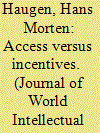

|
|
|
|
|
| Publication |
2010.
|
| Summary/Abstract |
Concerns have been expressed over the role of the World Intellectual Property Organization (WIPO) in influencing the intellectual property policies of other specialized agencies of the United Nations. This article reviews the policies of the Food and Agricultural Organization (FAO), World Health Organization (WHO) and United Nations Educational, Scientific and Cultural Organization (UNESCO), in addition to WIPO itself, and finds very interesting patterns of cooperation. While intellectual property law is primarily concerned with providing incentives for the production of new, creative and applicable arts and knowledge, human rights law is primarily concerned with providing improved access to goods crucial for human well-being and survival. While UNESCO has paid less attention to intellectual property rights over the last decades, rather emphasizing cultural preservation, both FAO and WHO have increased their focus on intellectual property rights. The latter two have increased their cooperation with WIPO, but without a formal agreement with WIPO. The article finds that WIPO, as a specialized agency, has to cooperate with specialized agencies, and there is no reason to believe that the cooperation will be in the form of a "one-way" process in which WIPO instructs the other agencies. At the same time, it must be acknowledged that intellectual property rights can also hamper research, in addition to impacting on the access to the crucial goods.
|
|
|
|
|
|
|
|
|
|
|
|
|
|
|
|
| 2 |
ID:
106179


|
|
|
| 3 |
ID:
177527


|
|
|
|
|
| Summary/Abstract |
ON OCTOBER 10, 2020, the Food and Agriculture Organization of the United Nations (FAO) marked its 75th anniversary. This specialized structure of the UN with a global mandate in food, agriculture, fisheries and development of rural areas predated the "big UN" (which celebrated its jubilee on October 24) by a week.
|
|
|
|
|
|
|
|
|
|
|
|
|
|
|
|
| 4 |
ID:
189180


|
|
|
|
|
| Summary/Abstract |
International Affairs: Looking back on the past difficult year, what has been the Food and Agricultural Organization's main concern regarding the agri-food sector? After all, the well-being and health of billions of people and the achievement of the second Sustainable Development Goal (SDG 2) - Zero Hunger - depend on this sector of the economy.
|
|
|
|
|
|
|
|
|
|
|
|
|
|
|
|
| 5 |
ID:
091801


|
|
|
|
|
| Publication |
2009.
|
| Summary/Abstract |
The world is facing the worst food crisis since the 1970s. According to the UN Food and Agriculture Organisation (FAO), about 862 million people are afflicted with hunger and malnutrition.
|
|
|
|
|
|
|
|
|
|
|
|
|
|
|
|
| 6 |
ID:
125114


|
|
|
|
|
| Publication |
2013.
|
| Summary/Abstract |
FOOD SECURITY ISSUES have been the focus of the Group of Twenty since about 2005. Then it became clear that the era of continually rising food prices and growing farm output - an era lasting almost 50 years - was over. Despite the impressive results of the Green Revolution (from 1961 to 2000, global food production increased from 800 million to 2.2 billion tons), the average yield of major grain crops has been steadily declining - for wheat and rice from 2.5-3 % to 1%. Moreover, these phenomena were accompanied by steep jumps in food prices in 2007-2008 and 2010-2012. According to an estimate by the Food and Agriculture Organization (FAO), in 2010-2012, nearly 870 million people were chronically undernourished and the number of hungry people in the world remained unacceptably high.
|
|
|
|
|
|
|
|
|
|
|
|
|
|
|
|
| 7 |
ID:
105335


|
|
|
|
|
| Publication |
2011.
|
| Summary/Abstract |
The issue of food security is a complex one, and, with the advancement of globalization, it is becoming ever more urgent. And as climate change rises to the top of the international agenda, the securitization of food issues is growing more complex. It has turned the spotlight on the issue of food security and introduces new challenges to every nation. Historically, China has been an agricultural country, and thus has always been concerned about food security, enacting various measures and policies over the years to protect its food supply. However, there are inherent uncertainties and many challenges in this area. To deal with the problem of food security caused by global climate change, China and other nations should rethink how they deal with food security, and establish a comprehensive food security strategy which engages with other strategies in economic development, agriculture and rural development, energy, water security and social development.
|
|
|
|
|
|
|
|
|
|
|
|
|
|
|
|
| 8 |
ID:
094326
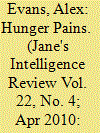

|
|
|
| 9 |
ID:
127527
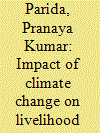

|
|
|
| 10 |
ID:
135066
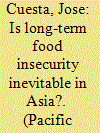

|
|
|
|
|
| Summary/Abstract |
This article questions two widely accepted claims on long-term food insecurity in Asia, the world's (heterogeneous) region with the largest number of undernourished individuals. The first claim is that food production may not grow as fast as the pace of population growth in Asia, which will reach 5 billion by 2050. The second claim is that an unstoppable emergence of a middle class in Asia will dramatically change the composition of food demand. On the first claim, the region's contribution to high and volatile international food prices is well known, but Asia's potentially positive contributions toward future price uncertainty and productivity growth are much less cited. On the second claim, the changing composition of future food demand in the region will depend on the extent that poverty reduction effectively leads to middle class expansion, which it is not an automatic process, and its extent still remains to be seen. Past evidence teaches us that poverty reduction on its own will not do the job of eradicating hunger, nor will only increasing food production. The jury is still out, but doomsday predictions are not necessarily justified.
|
|
|
|
|
|
|
|
|
|
|
|
|
|
|
|
| 11 |
ID:
138365
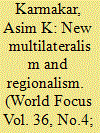

|
|
|
|
|
| Summary/Abstract |
Over the last two decades and more, the world has had witnessed rapid expansion of global trade and reduction in tariff rates both through the multilateral arrangements under the WTO as well as various types of trade cooperation agreements including RTAs. And India as an emerging giant and an efficient economic diplomat meanwhile placed itself as a key player in expanding world trade as well as reducing the tariff rates that so far distorted the world affairs. Eventually she is increasingly becoming a harsh critic of developed countries which still are resorting to the use of non-tariff measures (NTMs) to protect their domestic home and industry.
|
|
|
|
|
|
|
|
|
|
|
|
|
|
|
|
| 12 |
ID:
113633


|
|
|
| 13 |
ID:
107395


|
|
|